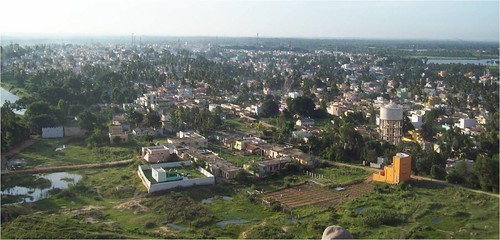/topics/lifestyle
Lifestyle
Catch Every Drop: The Water Warrior contest
Posted on 27 Feb, 2013 06:08 PMImagine there's no water
It isn't hard to do
Nothing to cook or clean with
And no flushing too!
Imagine all the people
Living life in vain
Strategies for achieving environmental sustainability in rural development - A report by United Nations Development Programme
Posted on 23 Feb, 2013 10:22 AMThis report by the United Nations Development Programme (UNDP) presents strategies for inclusive rural development embodying the principles of environmental sustainability. It recommends measures needed to achieve green, including measuring and tracking, the use incentives and the building of capacities. It also contains a number of case studies showing how green results can be achieved.
Assessing the land use change and its impact on water resources: A study on the Mula and Mutha rivers catchment area in Pune
Posted on 17 Feb, 2013 09:11 PMLand use changes hydrologic system and have potentially large impacts on water resources. An assessment in an area with seasonally limited water availability and which is subject to rapid socio- economic development and population growth will provide an exemplary view on the local impacts of major recent developments in India. In this backdrop this paper analyzes past land use changes between 1989 and 2009 and their impacts on the water balance in the Mula and Mutha Rivers catchment upstream of Pune. The aim of the paper is:
- assess the land use changes between 1989/1990 and 2009/2010
- analyze the impacts of these changes on the long-term water balance components in the Mula and Mutha Rivers catchment upstream of the city of Pune.
Influence of anthropogenic contamination on fluoride concentration in groundwater: A study of Mulbagal town, Kolar district, Karnataka
Posted on 15 Feb, 2013 04:53 PMGroundwater contamination is a serious, but relatively ignored issue in the country. This contamination occurs in either through geogenic or anthropogenic means. Fluoride contamination is one such example of geogenic contamination that is widely found in the Kolar district of Karnataka. However, the fluoride levels in the town of Mulbagal are lower than those in the surroundings. Earlier, a study was conducted on the impact of pit toilets on the groundwater in the area. The present paper investigates the presence of any link between these two phenomena.
Sukhi Jeevana - Living with Wisdom, Residential retreat organized by Janapada Seva Trust, Suvidya and Arivu Educational and Cultural Trust at Melukote, Karnataka, February 15-17, 2013
Posted on 29 Jan, 2013 06:49 PMVenue
Hosa Jeevana Dari Farm, Melukote, Karnataka
Melukote is around 70km from Mysore and around 140km from Bangalore. Hosa Jeevana Daari centre is 7 Kms away from Melkote. Situated in a serene atmosphere on the Melkote – Chinakuruli road with 25 acres of land. Once at Melukote, you may take an auto to reach the farm.
Organizers
Forced displacement: A gendered analysis of the Tehri dam project, Uttarakhand - An article in EPW
Posted on 10 Jan, 2013 08:18 PMThis paper by Vandana Asthana in the Economic and Political Weekly (EPW) examines the lived experiences of displaced women based on the empirical findings of research that looks at women displaced by the construction of the Tehri Dam and their relocation elsewhere.
Effect of drinking arsenic-contaminated water in children- Article in Indian Journal of Public Health
Posted on 09 Jan, 2013 10:44 PMThis paper in Indian Journal of Public Health sheds light on the specific impact of arsenic on health of children based on the review of literature on the subject. The effects of chronic arsenic toxicity under the following aspects:
- Psychological
- Skin abnormalities
- Lung diseases
- Defect in intellectual function
- Genetic issues
National Foundation for India invites applications for its 18th National Media Fellowship programme - Apply by November 30, 2012
Posted on 23 Nov, 2012 02:46 PMAbout the National Foundation for India
"Quotes from the Earth" film festival, Toxics Link and India International Centre, December 6-7, 2012, New Delhi
Posted on 20 Sep, 2012 07:09 PMOrganiser: Toxics Link and India International Centre
Venue: India International Centre
#40, Max Mueller Marg
New Delhi


Toxics Link is an information outreach and environmental advocacy organization set up in 1996. It has special emphasis on reaching out to grassroots groups and community based organizations. The areas of its engagements include research, outreach and policy advocacy on issues of communities and urban waste, toxics free healthcare, hazardous wastes, and pesticides. Toxics Link communicates with all stakeholders, from a civil society perspective. Its networks and partners are national, regional as well as international.
India International Centre is a non-government institution widely regarded as a place where statesmen, diplomats, policy makers, intellectuals, scientists, jurists, writers, artists and members of civil society meet to initiate the exchange of new ideas and knowledge in the spirit of international cooperation. Its purpose, stated in its charter, was ‘to promote understanding and amity between the different communities of the world’. In short, the Centre stands for a vision that looks at India as a place where it is possible to initiate dialogues in an atmosphere of amity and understanding.
"Kund - Etijyomoyer jaler etijyo" - Bengali translation of Anupam Mishra’s book by Nirupama Adhikari, about the kunds of Rajasthan
Posted on 19 Sep, 2012 03:20 PMRainwater harvesting is the new buzzword for a world wracked by climate change and increasingly limited stores of fresh water. But in rain-starved Rajasthan, communities have been harvesting water for ages.
Dr Anupam Mishra’s booklet , “Kund - Etijyomoyer jaler etijyo”, a Bengali translation of the original in Hindi, describes the ideas and principles that lie behind this legacy of conserving water in an environment bereft of this precious natural resource.







